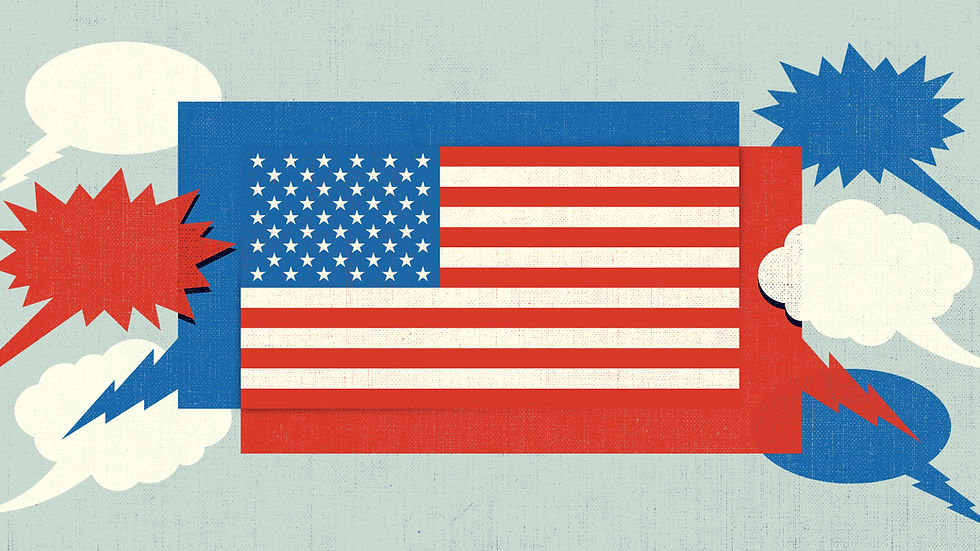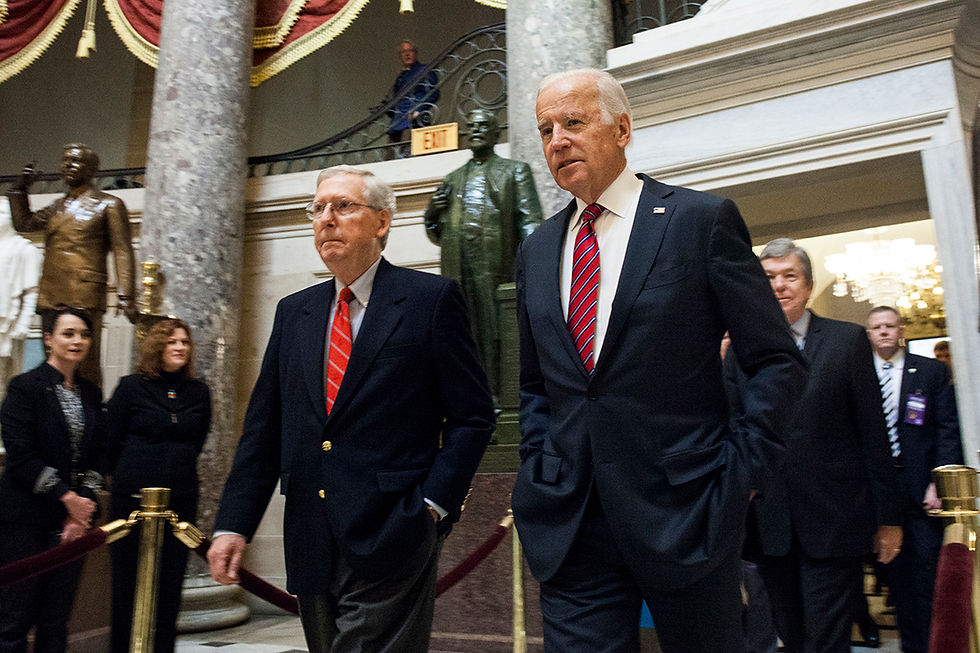Where Has Bipartisanship Gone? Political Unity from 1787 to 2021
- Sam Duan
- Mar 23, 2021
- 5 min read
Updated: Mar 27, 2021
Bipartisanship -- a word, over the four years of the Trump presidency, repeated like folklore and vacuous as fairytale. Gridlock, government shut-downs, and each side blaming the other for inaction as they sat firm in their own uncompromising positions, leaving some feeling uncertain while others mobilized.

President Joe Biden now faces a dilemma. With a deadlocked House of Representatives and the tie-breaking vote of Vice President Kamala Harris in the Senate, he has the capital and capacity to carry out the promises made by the Democratic Party in his presidential platform. On the other hand, to ignore Republicans would not only go against the theme of unity during his campaign, but also be a callback to Trump’s disregard for the Democrats in the past four years.
Bipartisanship is a situation where “opposing parties find common ground through compromise.” In essence, it is an act of power-sharing and goodwill between opposing political interests. Much like how the invisible hand of the market creates benefits for all out of the self-interest of one, bipartisanship makes social progress and political stability out of a party’s desire to stay in power.
The history of the U.S. is weaved together by compromises. From the Great Compromise that defined the nation in 1787, to Lincoln’s Team of Rivals in 1860, to Sen. Arthur Vandenberg’s (R-MI) 1945 address that defined post-WWII American foreign policy, bipartisan action creates the most stable and long-lasting impact on the course of the nation.

From Sen. Vandenberg’s Senate address in 1945 until the collapse of the Soviet Union in 1991, regardless of their differences in domestic policy, the Republicans and the Democrats had one clearly defined common interest, that being national security against the USSR. The Defense Production Act, for example, initially established under Democratic President Harry Truman for the purpose of mobilizing the economy for the Korean War, had been reauthorized “over 50 times” throughout the years, across progressive and conservative governments. Both Trump and Biden utilized the DPA to increase American production of PPE and vaccine supplies in the last year.
As soon as the Soviet Union collapsed, however, the U.S. was thrusted into a hegemonic position without a serious contender in the global theater. Foreign policy no longer served to deter a nuclear-capable power from making advances at America’s expense, but instead became a force to maintain the status quo of the global distribution of power. National security, as important as it is, ceased to be as significant of a binding factor as it had been during the Cold War.
Bipartisanship, however, did not end with the Cold War. The Great Recession in 2008 also fostered in some level of bipartisan cooperation. The Great Recession was triggered by a subprime mortgage bubble that burst in 2007. A subprime mortgage is a housing mortgage with a higher interest rate lent to a person with a credit rating too low for a normal mortgage. The bubble burst when too many people defaulted on those subprime mortgages and did not pay back.
In early 2008, when the crisis was yet to become a full-fledged recession, Congress passed the Economic Stimulus Act of 2008 (H.R.5140), which offered tax rebates, corporate tax incentives, and mortgage relief. The bill passed with a wide range of bipartisan support: originally sponsored by the Speaker of the House, Rep. Nancy Pelosi (D-CA), the bill was joined by 9 other Democrats and 5 Republicans, and passed the House with an overwhelming majority (385 - 35), the Senate with an amendment (81 - 16), and the House again with an overwhelming majority (380 - 34).

Nevertheless, the Economic Stimulus Act of 2008 proved to be insufficient. By the end of the Bush presidency, the Great Recession was in full swing. Congress then passed the Emergency Economic Stabilization Act of 2008 (H.R.1424) in a similar fashion. The bill called for the government to purchase “troubled assets” possessed by the subprime mortgage lenders, and extension of some existing corporate tax incentives. It was originally sponsored by Rep. Patrick Kennedy (D-RI), and was later cosponsored by 232 Democrats and 41 Republicans.President George W. Bush mentioned the bill in his 2008 State of the Union Address as the result of cooperation between Congress and the executive branch.
During the Obama presidency, however, the climate for bipartisanship deteriorated. Partisan discipline became celebrated on the side of the Republicans. During the 2010 elections, two years after President Obama took office, the House Republicans embraced a “no compromise” rhetoric in their campaigns. Former Vice President Mike Pence, then a Representative from Indiana, was quoted to say on CNN: “. . . there will be no compromise on ending this era of runaway spending. ..On issues that go straight to principle and straight to the concern the American people have on spending and taxes and values, there’ll be no compromise.” Wedge issues like abortion and healthcare became more pronounced and ideological in the Party’s rhetoric; no compromise partisan obstructionism became a strategy the GOP employed to claw back to competitiveness.
The strategy delivered in 2014 by propelling the Republicans to majorities in both the House and the Senate, and again in 2016 by thrusting Donald Trump into the White House. The rest is not-too-distant history -- deadlocks, government shut-downs, presidential tantrums, etc. Bipartisanship became politically difficult and scarce over the past presidency, with a base that seems to favor compromise that only comes from the other party. Under this context, Sen. John McCain’s “Nay” vote against his party’s plan for a “skinny repeal” of the Affordable Care Act (Obamacare) was suddenly viewed as a heroic act among the progressives, even though the rationale behind his decision was not that he believed in the Act. Sen. McCain’s office later stated that, while Sen. McCain disagrees with the Affordable Care Act, he voted no on the basis that the Republicans did not have a sufficient replacement, and called on lawmakers to “return to the correct way of legislating. . . receive input from both sides of [sic] aisle”. Cooperation across the aisle, by the beginning of the Trump presidency, had become extraordinary -- in both senses of the word, and was only exacerbated over the Trump years.

The current lack of bipartisanship may not be merely caused by a lack of goodwill in Washington, since goodwill alone does not carry much political weight. The absence of a perceived major, universal threat to all of the United States (the COVID-19 pandemic seemed to unite Congress, but not the Trump White House until later) all contribute to the current “lack of sportsmanship” in Washington. This may change in the next few decades, if the democratic institutions in the US are strong enough to withstand the current levels of polarization, with a rising China and the implications in both foreign and domestic policy changes that would be required to cope with the shifting balance of power. A reversion to Cold War era policy would not be desirable for the delicate peace that we enjoyed since 1991; but by some perverted irony, a world in conflict may yield peace and unity at home. Until then, Biden's pursuit of bipartisanship will go beyond a demonstration of good will and instead be a part of a vital process for the Republican Party to de-radicalize itself, lest it turns further to the right -- and try to bring back the party of decency embodied by the late Sen. John McCain.
Further articles written in collaboration with Roar News can be found on their website.






NOL Card is a smart contactless card for paying fares across Dubai. It enables users to travel efficiently without carrying cash. Its flexibility, fast recharging, and support for multiple transport services make it ideal for everyday commutes.
Unleash your ultimate pleasure in Incall Escorts in Delhi, allowing dreams to come alive with our trustworthy escort service. Our professional escort girls at higher escort service will fulfill your most desires like no other.